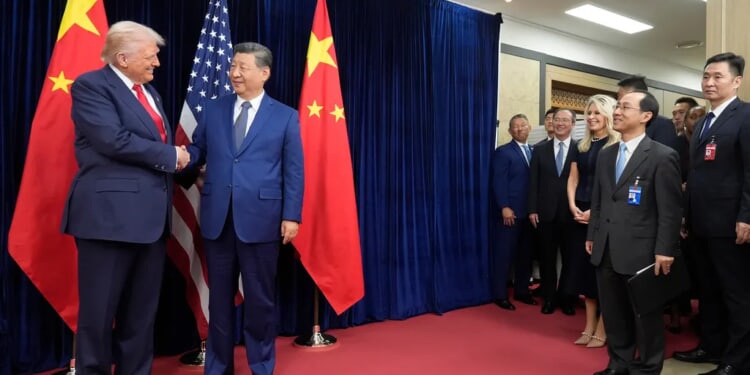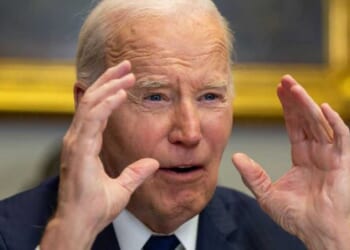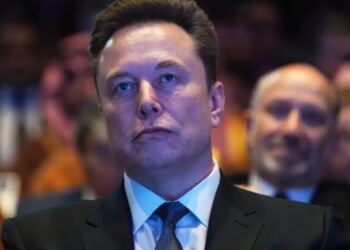Stocks for producers of rare earth elements rose Thursday after President Donald Trump and Chinese President Xi Jinping reached a truce to ease restrictions on exports of the minerals from China.
The market reaction suggests that investors appreciate the certainty offered by the deal, and that they still see value in the production of rare earths outside China, which currently dominates the supply chain and has threatened to choke off supplies. The Trump administration has sought to boost domestic production of the minerals because they are critical for defense and energy applications, and reliance on China is proving to be a liability.
At the close, Critical Metals was up 11%, Energy Fuels was up 6%, and USA Rare Earth closed down 2%.
MP Materials rose 1%. MP Materials operates the Mountain Pass Mine in California, the only rare earth mining and processing site in the U.S., and it is of particular note because the Trump administration has effectively turned it into a national champion. The Department of Defense, now called the Department of War, entered a multibillion-dollar deal earlier this year that involved taking a direct stake in MP Materials and offering a minimum price for its product.
Zahava Urecki, a senior policy analyst with the Bipartisan Policy Center’s Energy Program, told the Washington Examiner that the rise in rare earth producer stocks could be due to the new “global certainty.”
“Overall, that seems to be a positive thing for markets as well as investors,” Urecki said.
Thursday’s deal, though, reached at the Asia-Pacific Economic Cooperation summit in South Korea, Xi met with Trump, involves China rolling back rare earth export controls imposed earlier this month, but stops short of rolling back restrictions put in place earlier in the year.
“We’re not completely getting rid of the export controls,” Urecki said. “I think that the U.S. and other countries still need to step up their game and really try to build these supply chains out as well.”
Specifically, China has agreed to lift the restrictions it imposed earlier this month on five additional rare earths. The limits were placed explicitly on technologies related to “rare earth mining, smelting, separation, metal smelting, the manufacturing of magnetic materials, and the recycling and utilization of rare earth secondary resources and their carriers.”
The restrictions require companies to gain permission from the Chinese Ministry to export rare earths or related technologies.
China agreed to suspend those restrictions for one year. Trump said he expects the pause to be extended beyond then. China said in the meantime it will “study and refine specific plans” related to export control measures.
Treasury Secretary Scott Bessent had called China’s restrictions on rare earths as pointing “a bazooka at the supply chains and the industrial base of the entire free world.”
According to the U.S. Geological Survey, between 2020 to 2023, the U.S. imported nearly 56% of its rare earth compounds and metals from China.
Urecki said that the agreement is a “positive” because it provides a “little more certainty.”
“Anytime there is a way that there can be some type of understanding or agreement so that we aren’t completely cut off from a supply chain that we aren’t fully able to have ourselves and with our allies, is a good thing to make sure that companies can be in a better position to be prepared for and trying to increase a domestic supply,” she said.
Despite the truce between the U.S. and China over the latest export controls, the agreement does not address previous restrictions. In April, China suspended exports of seven types of rare earth metals and magnets, requiring companies to gain a license from the ministry for any exports.
Sarah Venuto, Executive Director of The American Critical Minerals Association, a bipartisan consensus-based advocacy organization working on critical mineral policies, told the Washington Examiner in a statement that the agreement between the United States and China is a “welcome one.”
CANADA EASING TARIFFS ON CHINESE EVS COULD SHAKE UP THE AUTO LANDSCAPE
But, she added, “[T]his is also an important reminder of the urgent need to diversify our critical mineral supply chains through additional partnerships with our allied trading partners and through the growth of a domestic critical minerals supply chain, including rare earth production and processing.”
“The Administration understands this, and we are encouraged by its additional efforts to ensure longer-term solutions to monopolistic market practices by our adversaries,” she said.
















